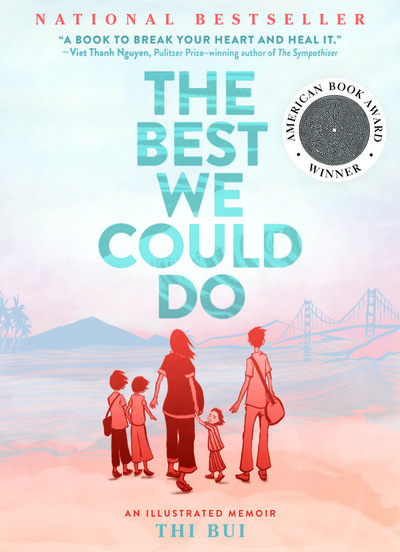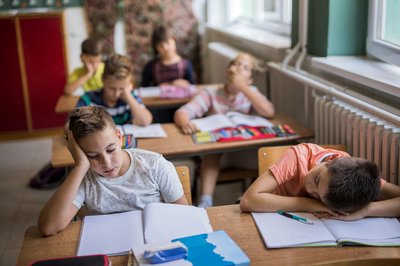" The Best We Could Do" is recommended for grades 9 and up. For a teacher's guide from the publisher, click here . For discussion questions from the NEA, click here . You can also read School Library Journal's starred review here .
by Evelyn Chi, sophomore, Amherst College
As a child of first generation Taiwanese immigrants, I have always been curious about my parents’ past lives, or who they were before they came to America. I hungered for stories of their childhoods in Taiwan, their school lives and how they met. I wanted to know why they decided to come to America — what pushed them to leave their comfortable homes behind and start anew in a vast, unfamiliar place.
Thi Bui’s graphic novel "The Best We Could Do " emerged from questions about her family history similar to my own questions. In this gripping and heart-wrenching memoir, Bui shares the stories of her parents growing up in war-torn Vietnam and her family's escape as refugees to the U.S .
Thi Bui’s graphic novel "The Best We Could Do" emerged from questions about her family history similar to my own questions.
Through heartfelt storytelling and hand-drawn illustrations brimming with emotion, Bui captures the perseverance and strength of immigrants. Despite poverty, bombings, famine and war, Bui’s parents and the Vietnamese people described here manage to survive and strive for a better future for their children.
Bui’s story begins with her father, Bo. Growing up in a poor countryside village in North Vietnam, Bo endures hardship from a young age. After the French reoccupy Vietnam in 1945, French soldiers raid Bo's village, killing villagers and forcing Bo’s family to flee to a neighboring town.
Bo is forced to hide in a secret lake dugout for four days while the French burn his village, with no food and only a small breathing hole to see if it was night or day.
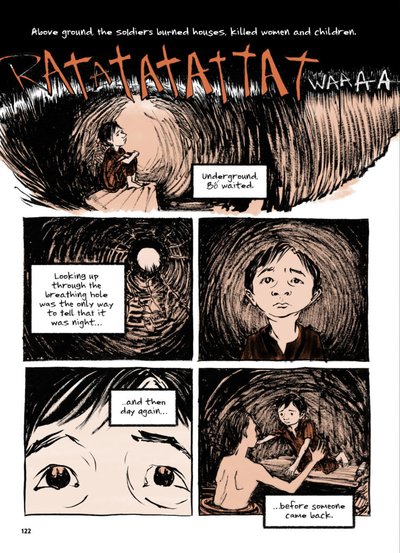
Excerpt from Thi Bui's "The Best We Could Do." Illustrations by Thi Bui. Courtesy of Abrams Books
In contrast, Bui’s mother Ma comes from a wealthy family and attends a French boarding school in South Vietnam. A bright student, she had hoped to become a doctor before marrying Bui’s father. But neither of Bui's parents are safe.
Shortly after the Tet Offensive of 1968, a series of North Vietnamese attacks on South Vietnam, police search both Bo and Ma, forcing them to kneel with their hands behind their heads at gunpoint while checking their registration papers.
While Bui’s mother came from a more privileged background, no Vietnamese was safe from the sky-rocketing inflation and police surveillance during the Vietnam War.
One specific scene that highlights the strength of refugees and the danger of war is when Bui’s family escapes Vietnam by boat to a refugee camp in Malaysia. Bo must learn to sail on the spot when the experienced sailor in their group suddenly becomes sick. With multiple families on board, Bui and her family sleep side-to-side on the wooden ship floor. Their water becomes infested with worms, and they have little to eat.
At one point, the refugee boat encounters several other ships that suspiciously start following them. Bo fears that they might be pirates, so he quickly navigates the boat away. When one crewmember remarks, “Oh god, if they catch us…”, Bo exclaims angrily, “I’ve heard the stories! Don’t you think I want to protect my wife and family as much as you do yours?!" (243)
In the illustration, Bo looks at the other man with a pained expression, his brow furrowed and hand clutching the boat paddle. This moment almost moved me to tears; I felt in awe of Bo’s self-sacrifice and his deepest motive for survival: to protect his family.
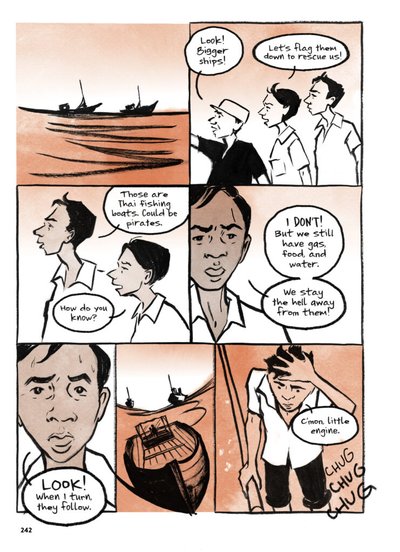
Excerpt from Thi Bui's "The Best We Could Do." Illustrations by Thi Bui. Courtesy of Abrams Books
Another prevailing theme throughout the novel is the role of motherhood and the challenge of building a family. The novel begins and ends with Bui enduring a painful labor process while giving birth to her son. Lying on the hospital bed, looking at her newborn baby, Bui reflects on her gratitude towards her own mother, the hardships of raising a child and fear of passing down intergenerational trauma.
Bui still hopes for a brighter future for her son, stating, “But when I look at my son now ten years old, I don’t see war and loss…I see a new life, bound with mine quite by coincidence, and I think maybe he can be free.” (340)
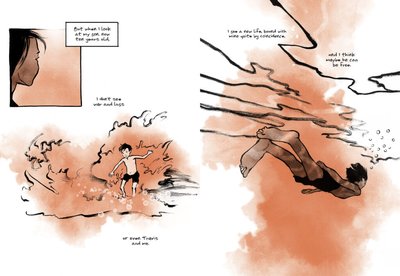
Excerpt from Thi Bui's "The Best We Could Do." Illustrations by Thi Bui. Courtesy of Abrams Books
Bui’s novel shows how despite the worst of odds, we as humans are capable of surviving, persevering and striving towards freedom. I recommend "The Best We Could Do" for anyone looking to better understand the Vietnam War and the lives of refugees, or as inspiration for other children of immigrants discovering their own family histories.
Evelyn Chi is a rising sophomore at Amherst College and intern at PBS NewsHour Classroom. She is an English major and potential Law, Jurisprudence and Social Thought double major interested in social justice, Asian American issues and arts education. In her free time, Evelyn enjoys baking, painting, reading and learning new languages.
